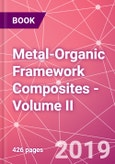The book focusses on the following applications: gas capture and storage, especially molecular hydrogen storage; performance enhancement of Li-ion batteries; gas separation, nano-filtration, ionic sieving, water treatment, and catalysis, etc.
Table of Contents
- Multiscale Study of Hydrogen Storage in Metal-Organic Frameworks
- Metal Organic Frameworks Based Materials for Renewable Energy Applications
- Metal Organic Frameworks Composites for Lithium Battery Applications
- Metal-Organic-Framework-Quantum Dots (QD@MOF) Composites
- Designing Metal-Organic-Framework for Clean Energy Applications
- Nanoporous Metal-Organic-Framework
- Metal-Organic-Framework-Based Materials for Energy Applications
- Metal-Organic-Framework Composites as Proficient Cathodes for Supercapacitor Applications
- Metal-Organic Frameworks and their Therapeutic Applications
- Significance of Metal Organic Frameworks Consisting of Porous Materials
- Metal Organic Frameworks (MOF’s) for Biosensing and Bioimaging Applications
- Nanoscale Metal Organic Framework for Phototherapy of Cancer








